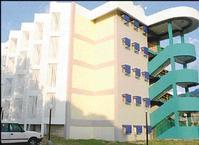
Winston Sill/ Freelance Photographer
The new Caribbean School of Architecture.
THE EUROPEAN Union has financed the establishment of a new building for the Caribbean School of Architecture unveiled this week at the University of Technology.
The five-storey structure is an expansion of the 6,000 square foot building that formerly housed the school. The original building was restored and 20,000 square feet of space added.
The development, funded largely by a $85 million grant issued through the European Commission's Caribbean Regional Indicative Programme, has given the architecture school a new 120-seat lecture theatre, a seminar/exhibition area, new classrooms, design studios, administrative offices, and facilities for staff.
It was one of several projects included in the Caribbean University Level Programme (CULP).
That programme is funded by the Europeans "in the framework of regional co-operation with Cariforum," the European Union's Kingston office said.
The construction work started in August 1998 and was completed in August 2000. Prime Minister P.J. Patterson and Gerd Jarchow, head of Delegation of the European Commission officially opened the facility Thursday.
"The new building is connected to the existing building at every level and an elevator, intended for disabled persons, will be available for everyone using the faculty," says UTech.
Together, The Caribbean School of Architecture and the School of Building and Land Management form the Faculty of the Built Environment, and a number of the facilities in the new structure are shared.
The European Union's grant also provided a small amount of funding for technical assistance, regional co-operation and scholarships for the Masters Degree programme.
The Caribbean School of Architecture was founded 1988 to serve all the English-speaking Caribbean countries, providing pre-professional and professional degrees in Architecture. Enrolment is dominated by Jamaicans; 30 per cent are non-nationals.
It offers a Bachelor of Arts and Masters degree, both accredited by the University Council of Jamaica and the Commonwealth Association of Architects, and is now seeking accreditation for the Bachelor of Science degree from the British Institute of Architectural Technologists and the UCJ, said UTech.
The course's concentration is biased towards issues peculiar to the region and the tropics generally, including "appropriate responses to the special pressures of climate, to different histories and cultures and to extremes of high and low resources, as well as the need to reconcile a regional identity with the international industrialised world."
UTech says, however, that the programme was sufficiently broad-based to be relevant globally.
"CSA remains committed to the development of a strong research base and will continue to strengthen its links across language barriers of the multi-cultural Caribbean countries including non English speaking territories of Cuba, Curacao, Dominican Republic, Guadeloupe, Martinique, Puerto Rico and Suriname."

